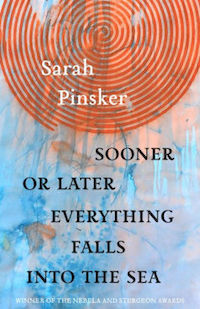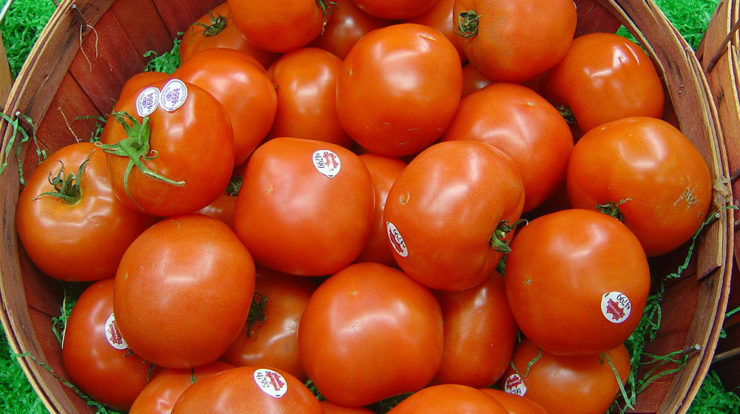We first need to establish the degree of my childhood aversion to tomatoes. It was fear, not dislike, since I’d never actually tasted one. There wasn’t a single form in which they weren’t scary: I rejected them as ketchup, gazpacho, soup, salsa, sauce, and in their natural form. White pizza only, please, and cream sauce on pasta. My sisters could chase me with a tomato and I would flee in terror—though granted, it was always safer to run if they were chasing me.
I’ve lied to you already. I said it was a childhood aversion, but it lasted until I was thirty.
In college, my fellow Girl Scout camp counselors created an “eww, get it off me!” dance to commemorate the time I accidentally sat on a ketchup packet. I accepted dinner invitations with the warning that I couldn’t eat tomato, and maybe I made it sound like an allergy even if I didn’t say that outright. I’d grown used to the question “What do you mean you don’t eat tomato?” Nobody blinks if you say you don’t eat Brussels sprouts or okra; it just so happens this particular fruit/vegetable is so ubiquitous that people are downright incredulous when you say you don’t eat it.
No tomato had ever harmed me, to my knowledge. There was no root for my distaste. It wasn’t like the day I asked my grandfather for a banana, and he gave me one; and I asked for another, and he gave me another, and so on until I had eaten all the bananas in the house and fulfilled my entire lifetime quota. I don’t know where the tomato aversion came from. Attack of the Killer Tomatoes at a formative age? Death by deadly nightshade in a previous life? Whatever the reason, I’d written tomatoes out of my life. That’s why it was so remarkable that Barbara Kingsolver’s Animal, Vegetable, Miracle: A Year of Food Life reformed me in one sitting.
My band was on tour in the South, and I was in the backseat reading. It’s one of those “my year of ___” books, where the author and her family had decided to live entirely off their family farm in Virginia (with a few necessary exceptions, such as coffee). There’s an eye-opening chapter on turkey sex, a hilarious account of her daughter’s chicken-raising enterprise, and who knew that you could only pick one or two stalks from an asparagus plant in its first couple of years, or else it would “sink into vegetable despair and die”? Certainly not me; I’d never gardened.
And then I came to the chapter on growing tomatoes, a chapter so lush in its descriptions I could practically taste the tomatoes…and I didn’t mind. It helped, too, that she described the tomatoes I’d grown up observing as “anemic wedges that taste like slightly sour water with a mealy texture.” I’d been justified in my aversion, clearly. The Jaune Flamme she described, slow-roasted and sprinkled with salt and thyme, bore absolutely no relation to what I thought of as a tomato.
We pulled into Durham with enough time to grab dinner on 9th Street before heading to the venue. My drummer and I chose a taco place, the kind with all the ingredients arrayed in silver dishes behind glass.
“Hey Tony,” I said. “Dare me to put tomato on my taco.”
He laughed. “You don’t eat tomatoes.”
“I will if you dare me.”
He dared me, and I did. I’ve had better since, but the important thing in that moment was that they were inoffensive, and I didn’t die, and maybe I hadn’t needed to run from my sister or to have done the get-it-off-me dance.
Buy the Book


Sooner or Later Everything Falls into the Sea
Kingsolver planted varieties like Silvery Fir Tree, Siberian Early, Brandywine, Green Zebra, the aptly named Dolly Parton. She wrote that they’d bear fruit in orange, in purple, in stripes; I’d never seen any evidence such things existed. July in Maryland rolled around, and a friend arrived at our house one day with a basket of farmers market tomatoes in a range of shapes and sizes and colors that proved Kingsolver was no liar. My friend had planned a themed feast: a tomato tart, a kaleidoscopic bread salad… I can’t remember what else, but it was tomatoes all the way down. I stayed away from the kitchen, afraid I’d talk myself out of it. By the time he was done cooking, the sun had set. We ate outside in darkness; I found I didn’t mind the taste when I couldn’t see them. No, not didn’t mind: I LIKED them.
The next spring, I planted a vegetable garden for the first time. I spent hours at the garden center, getting to know dozens of heirloom varietals. I chose Early Girl, quick-growing; Lemon Boy, perfect yellow globes; Sweet Millions, with grape-like clusters. I cheered the thick stems, the earthy-smelling leaves, the first yellow flowers, the adorably tiny green orbs that grew larger every day, and gradually took on new hues. (The dog discovered his own love of gardening around then, initiating a years-long war involving progressively higher chicken wire and his amazing Spider-man impersonation).
When I picked my first ripe homegrown Early Girl, it was heavier than I expected. It looked nothing like the tomatoes I’d grown up fearing, nothing like the watery Beefsteak tomatoes at the grocery store. Deep red all the way through, velvety, acidic, sweet. I ate it with the basil I’d grown alongside it, farmers market mozzarella, balsamic vinegar, and a crusty bread. It was worth the thirty-year wait.
“Fresh garden tomatoes are so unbelievably tasty, they ruin us utterly and forever on the insipid imports available in the grocery,” Kingsolver wrote, and with her lovely descriptions, turned me into both a gardener and a tomato-eater. If this is a strange digression from science fiction and fantasy, it still has something in common with the other posts in this series: a single book can truly change your life—and even your tastebuds—forever.
Photo: Heavybluesman. Licensed under the Creative Commons Attribution-Share Alike 3.0 Unported license.
Sarah Pinsker’s stories have won the Nebula and Sturgeon awards, and have been finalists for the Hugo, the Locus, and the Eugie Foster Memorial Award. Her first novel, Song For A New Day, will be published in autumn 2019. She is also a singer/songwriter with three albums on various independent labels and a fourth she swears will be released someday soon. She was born in New York and has lived all over the U.S. and Canada, but currently lives with her wife in Baltimore in a hundred-year-old house surrounded by sentient vines. Find her @sarahpinsker.










